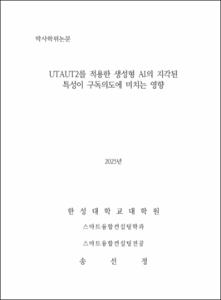UTAUT2를 적용한 생성형 AI의 지각된 특성이 구독의도에 미치는 영향
= Study on the effect of perceived characteristics of Generative AI on Subscription intention applying the Extended Unified Theory of Acceptance and Use of Technology (UTAUT2)
- Appears in Collections:
- 스마트융합컨설팅학과 > 1. Thesis
- Files in This Item:
-
-
Download
 200000851726.pdf
기타 데이터 / 2.17 MB / Adobe PDF
200000851726.pdf
기타 데이터 / 2.17 MB / Adobe PDF
-
Items in Repository are protected by copyright, with all rights reserved, unless otherwise indicated.